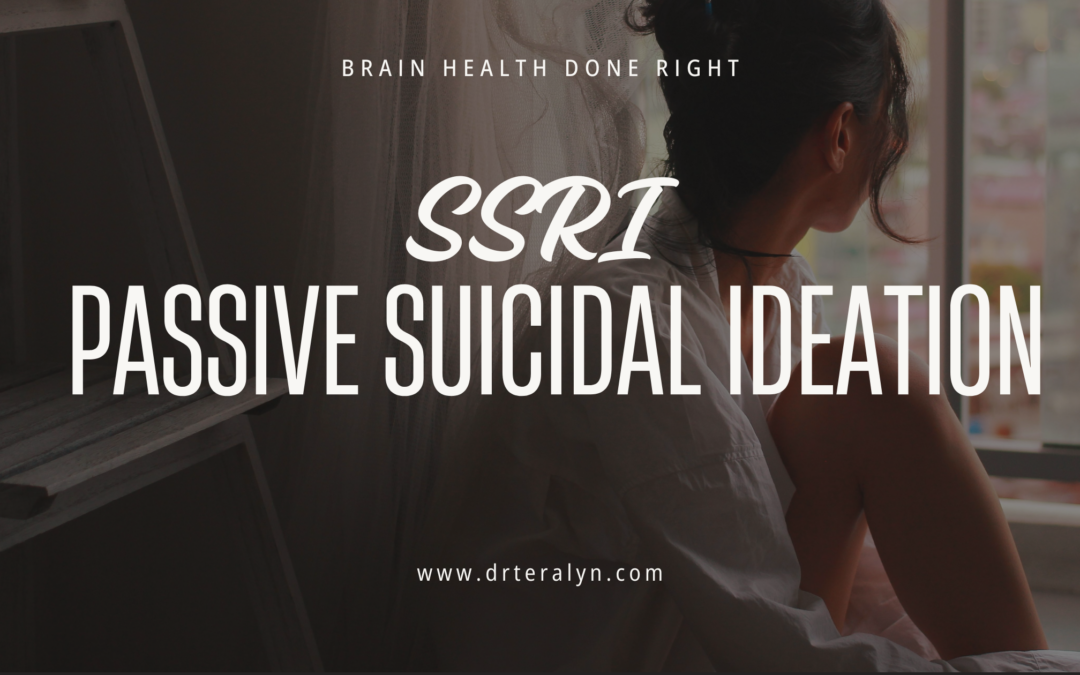When people seek help for anxiety, depression, or other mood disorders, selective serotonin reuptake inhibitors (SSRIs) and serotonin-norepinephrine reuptake inhibitors (SNRIs) are often among the first-line treatments prescribed. These medications are marketed as life-saving but for many people, they come with unexpected—and deeply unsettling—side effects. One that’s not often talked about enough? Passive suicidal ideation.
What Is Passive Suicidal Ideation?
Passive suicidal ideation doesn’t necessarily mean someone wants to actively end their life. Instead, it often looks like thoughts such as:
-
“I wouldn’t mind if I didn’t wake up tomorrow.”
-
“If something happened to me, that would be okay.”
-
“I’m just so tired of everything.”
These thoughts can sneak in quietly, and because they don’t always include a specific plan or intent, they often go unnoticed—or worse, dismissed.
A Personal Reflection: What I Didn’t Realize at the Time
When I was on sertraline (Zoloft) for six years, I too didn’t care if I lived or died. I welcomed the idea of something just… ending. At the time, I didn’t fully understand what was happening. Looking back, it’s clear that I was experiencing a side effect that nobody talked about. This was a season of life where I should have felt the most alive, involved, and connected. But I wasn’t.
Instead, I was negative, angry, emotionally disconnected, and numb.
And here’s the part that hits me hardest: I didn’t feel this way before I was medicated. But I absolutely felt it while I was medicated. I didn’t realize how much the medication was dulling my emotions and clouding my perception of life until I came off of it—and slowly, I started to regain my life. The colors came back. I started to feel again. And only then did I fully understand what I had lost during those years.
The Role of Emotional Numbing
This story isn’t uncommon. One of the more frequent side effects of SSRIs and SNRIs is emotional numbing—a sense of feeling detached from your own experiences and emotions. While these medications aim to ease suffering, they can also blunt emotional highs and lows alike sapping the life out of people.
This can look like:
-
Feeling indifferent to people and experiences that once brought joy
-
Lacking emotional response to things that would normally move you
-
Feeling like you’re just getting through the day, not living it
- Feeling disconnected from self and others
Passive suicidal ideation can be part of this emotional numbing process. When you’re emotionally disconnected from the world and from yourself, thoughts like “what’s the point?” can feel natural—even though they aren’t a reflection of who you truly are.
Why Don’t We Talk About This More?
It’s common to feel hopeful when you finally get a prescription after struggling with depression or anxiety. So when uncomfortable side effects show up, especially ones as confusing as these, it’s easy to feel ashamed or uncertain. If we bring it up to our prescriber we are often met with “you need a higher dose” instead of maybe you don’t need this medication at all.
Many people silently wonder:
-
“Is it just me?”
-
“Shouldn’t I be feeling better?”
-
“Do I just need to give it more time?”
But the truth is, these thoughts deserve to be talked about—without fear, without judgment.
What You Can Do
If you or someone you love is experiencing passive suicidal thoughts after starting an SSRI or SNRI, know this: you are not alone, and this doesn’t mean something is wrong with you.
Here are some things to consider:
-
Talk to your prescriber right away. This is a sign that your medication may not be the right fit. A dose adjustment or a different approach might be needed. Be persistent – this isn’t about needing more medication
-
Never stop your medication cold turkey. Always work with your provider to taper safely if needed.
-
Explore complementary therapies. From nutrition and movement to trauma-informed therapy, there are many supportive tools that can help you feel like yourself again.
-
Track your experience. Keeping a journal of emotional shifts can help you spot patterns and advocate for changes when necessary.
-
Stay connected. Reach out to people you trust. You don’t have to go through this alone.
- CONSIDER A SAFE MEDICATION TAPER PLAN. Reach out we can help you depresribe safely and effectively
Final Thoughts
Medications like SSRIs and SNRIs aren’t a one-size-fits-all solution. If you’re experiencing emotional numbness or passive suicidal ideation, it’s okay to question whether your current treatment is really working for you. It’s ok to explore life without medication as long as you have a safe tapering plan.
You’re not broken. You’re not ungrateful. You’re waking up to the possibility that there might be another way.
You’re allowed to feel more than just “fine.” You’re allowed to truly live—and reconnect with the full, vibrant, complex range of human emotion.
Much Love! Dr. Teralyn

